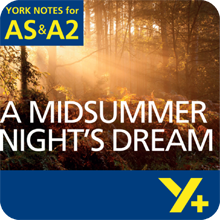Your Assessment
Read through the answer below and decide what grade to give it. Use the Hints & Tips to help you make your assessment.
Although "A Midsummer Night's Dream" begins and ends at the Athenian court, most of the play (Acts II to IV) takes place in a wood beyond the city, where invisible fairies cast spells over two groups of humans. In the short term, the spells produce chaos and dramatic conflict, which is entertaining for the audience, but stressful for the characters. In the longer term, the humans' problems are solved and, along the way, the audience are encouraged to see the irrationality of love, theatre and social hierarchy. The interaction between the magical fairies and the Athenian mortals therefore strongly shapes the play's dramatic power and meaning.
Athens is a city famous for its great philosophers like Aristotle, so it is only to be expected that its ruler, Duke Theseus, is a man of reason, maintaining order and promoting reconciliation. When Hermia refuses her father's choice of husband, Theseus feels obliged to take a firm line with her, but his reference to 'some private schooling' lets us know that he is going to have equally firm words with Egeus and Demetrius to persuade them to climb down. Theseus is proud of his emotional intelligence, boasting to Hippolyta of his success in dealing with nervous dignitaries, but the evidence suggests that he is less skilled than he thinks. He allows demoralising comments about the craftsmen's play to be heard by them, he fails to get Hippolyta enthusiastic about their wedding, and his reasoning never persuades anyone to change their mind about anything. It takes the magical intervention of the fairies, not the arguments of Theseus, to put Demetrius back in touch with his feelings.
The world of the fairies is a kind of alternative world to Theseus's court, a chaotic place where the problems of love can be explored with greater dramatic effect. The fairy king and queen are a similarly troubled couple to Theseus and Hippolyta, but they express themselves more passionately – they make wild allegations and enlist their supporters against each other. Where Theseus tries to play down his military conquest of Hippolyta, Oberon is more than willing to humiliate and subdue his wife, putting the juice on her eyes with the curse, 'Wake when something vile is near!'. Many productions have brought out the link by casting the same two actors as the couples. Some also use the actors playing Bottom's fellow craftsmen as his fairy attendants. These doublings are likely to be effective in entertaining the audience. They turn Theseus into a vengeful supernatural force and Quince into a grovelling servant, which is bound to seem comical.
The juice which the fairies use to solve the lovers' problems symbolises the irrationality of love. 'The will of man is by his reason swayed,' Lysander proclaims to Helena, 'And reason says you are the worthier maid.'
His misplaced confidence is shown in his rhythmic stress on the word reason, but the audience know that his sudden longing for Helena is simply due to the puck's mistake in putting the juice on the wrong man's eyes. The device of the juice is effective in creating successful drama, as we see the lovers descend from courtly love to insults and threats.
Another aspect that links magic with the heightened drama of the play is the freedom that the magical space of the wood provides. To critics like Jan Kott, who is influenced by Freud's theory that dreams express subconscious desire, the events in the forest can be interpreted as shockingly taboo breaking: Titania's relationship with Bottom reveals that women want animal passion and Oberon's trick on her reveals that men want to watch! However, Bottom's comic appearance and behaviour are more laughable than erotic. Surely the key taboo being broken here is that of social hierarchy. Is social class as irrational as love? Is Bottom really so different in kind from the king and aristocrats of Athens? His acting skills are good enough to imitate courtly behaviour and his treatment of his fairy 'inferiors' compares favourably with the way the aristocrats ridicule the craftsmen in Act V.
